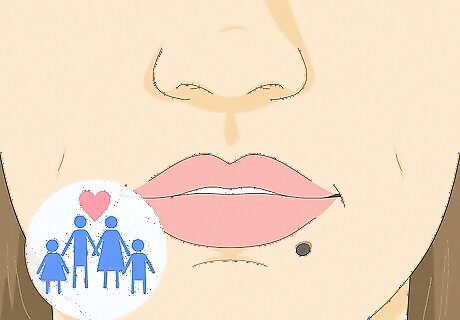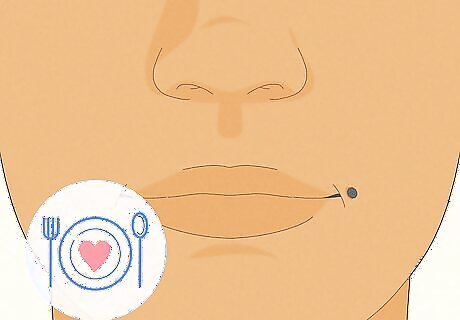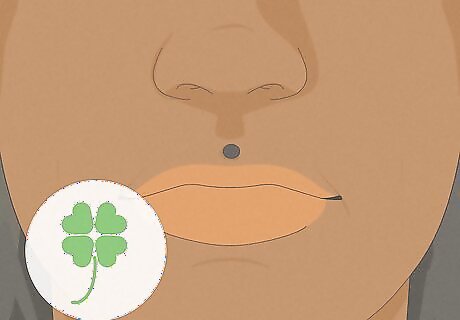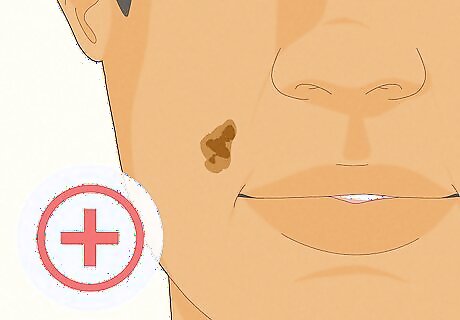
views
- Spiritually, a mole on the lip means you will lead a life full of adventure and prosperity.
- A mole on the upper lip suggests you’re an empathetic person, while a mole on the lower lip denotes you’re diligent and family-oriented.
- A mole in the corner of the lip indicates you’re a foodie, while a mole below your lip predicts you’ll travel the world and live life on your own terms.
What does a mole on the lip mean spiritually?

A mole on the lip may signify positive character and prosperity. People with this distinct feature tend to be go-getters. They have a desire for the finer things in life, so they’re not afraid to challenge themselves and seize opportunities. By putting in the work to set goals and achieve them, they can expect to live long, fruitful lives filled with discovery and adventure. When it comes to reading face moles, their spiritual meaning can change depending on location. “Lucky” moles are believed to be hidden, hairy, and pure red or black in color. “Unlucky” moles are visible, hairless, and mixed in color.
Lip Mole Meaning by Location

Upper lip Having a mole on the upper lip suggests you are a kind and empathetic person: you love to make people feel good, so you’re always there to lend a listening ear or share some words of encouragement. Other people find this trait incredibly attractive, so you can expect to make lots of friends in life. However, be sure to make time for yourself to protect your well-being too! Alternatively, a mole on the inner side of your upper lip could mean you’re skilled in mantra meditation. For females, having a mole on the upper lip means you’re attractive and sensual. You know how to flirt with people and make it clear when you’re interested.

Lower lip A mole on the lower lip may indicate you’re diligent and family-oriented: you probably have a jam packed schedule with other people, even on the weekends. Since you’re always out and about, you’ll have the opportunity to meet new people often, which may prompt you to jump into romantic relationships quickly. Alternatively, having a mole on the lower lip could mean you have a passion for acting or theater.

Corner of the lip If you have a mole on either corner of your lip, it could mean you’re a foodie: you love trying new dishes, immersing yourself in different cultures, and finding the latest restaurants in your area. While there’s nothing wrong with having a strong passion for food, be mindful of your eating habits to avoid weight gain and other possible health issues. Alternatively, having a mole on the corner of your lip could mean you enjoy luxury items.

Above the lip Also known as the philtrum mole, a mole on the center of your Cupid’s bow may signify good luck if it is hairy or pure in color. It suggests that you will live a successful and abundant life, and you won't have to worry about meeting your physiological needs (clothing, food, shelter). If your mole is unlucky, or hairless or mixed in color, it could indicate you struggle to adapt to change.

Below the lip Having a mole below your lips is believed to represent a long life filled with adventure. You might travel the world, moving from place to place without a fixed address. Or, you might settle down in a remote area, disconnected from technology and other people. Wherever life takes you, you’ll be able to confidently say that you live on your own terms. If you have a mole that’s centered directly below your lip, it suggests you are decisive but do not possess determination.
Why do I have a mole on my lip?

Moles form on the lips when your skin cells grow in a cluster. Moles are small clusters of pigment-producing skin cells called melanocytes, which make the pigment that gives your skin its natural color. Most people have between 10 to 40 moles that appear during childhood or the first 20 years of life—most likely on parts of their body that get more sun exposure. The highest risk factor for skin cancer is excessive sunlight, so be sure to apply sunscreen over your mole before going outside. Use sunscreen with SPF 30 for substantial sun protection, and protect your lips with lip balm that has at least SPF 15.
When to See a Doctor

Visit a dermatologist if you see a large, discolored, or asymmetrical mole. While most moles are benign, some can develop into melanoma (a serious form of skin cancer). Examine your skin once a month to check for changes in your existing moles, especially if you have fair skin or a family history of skin cancer. If you notice a mole that has any of the following ABCDE signs, schedule an appointment with your dermatologist as soon as possible: Asymmetry: Most melanomas are asymmetrical, instead of perfectly round. Border: Melanomas often have uneven borders, or edges, that appear blurred or jagged. Color: Melanomas are typically different shades of brown, tan, or black, instead of being a single color. Diameter: Melanomas are usually wider than 0.25 in (6 mm), the size of a pencil eraser or larger. Evolving: Any changes in size, shape, color, elevation, or symptoms (itching, crusting, bleeding) are warning signs of melanoma.



















Comments
0 comment